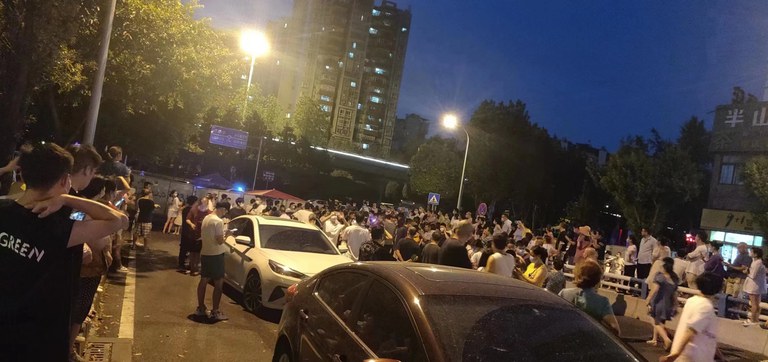Dissent against the Chinese government’s zero-COVID policy has been growing in recent days, with protests over restrictions in the southwestern megacity of Chongqing and calls from a Beijing-based think tank for changes to the policy of targeted lockdowns and ongoing compulsory mass testing.
Hundreds of people came out in angry protest at a residential compound in Chongqing’s Shapingba district on Saturday night, with people complaining that the lockdown persisted despite not a single COVID-19 case having been found for 10 days straight.
Local officials eventually lifted restrictions after hundreds of people gathered in Fangcao around roadblocks preventing traffic in and out of their area.
Video footage posted to social media showed riot police deployed at the scene, with residents standing in the middle of the road arguing with police, while officials stood in a human chain to control them.
“Lots of people are kicking up a fuss. the SWAT team is here,” one resident says on the video. “The government won’t ease the lockdown, which affects several thousand [households].”
A local resident who gave only the surname Liu said nobody has tested positive in that community in 10 days, but thousands remain confined to their homes.
“The residents met at the Fangcao traffic circle in Lianfang Street, demanding that they lift the restrictions,” Liu said. “The government has now agreed to the residents’ request and promised to lift restrictions.”
But that wasn’t the end of the matter, she said, adding that she doesn’t live in the compound, but nearby.
“There have been no positives in the whole street, but the lockdown has not been lifted and there has been no protest,” Liu said.
The Chongqing Municipal Health Commission said on Monday that the city had added 10 new local confirmed cases and 18 local asymptomatic infections the day before, five of which were in Shapingba.
A resident of Chongqing’s Gubei Shuicheng district who gave only the surname Dong said just one COVID-19 case will mean lockdown for an entire district.
“Even if they just find one case, they will lock it down,” Dong said. “We were locked down here in Gubei Shuicheng 10 days ago for a week, and had to do PCR tests every day.”

Public transport suspended
Meanwhile, authorities in the northern city of Shijiazhuang have stopped all public transportation links in and out of the city after a local COVID-19 outbreak of more than 25 asymptomatic cases, state media reported.
Residents in four districts are required to work from home from 2:00 p.m. on Sunday to 2:00 p.m. Wednesday, the Global Times newspaper cited a government statement as saying.
“During the same period, all places, excluding those necessary for city operation, market supply, public services, and disease prevention and control, are required to be shut down,” it said.
It said the outbreak in Shijiazhuang, a city 180 miles (290 kilometers) from Beijing, had “increased the pressure on the capital.”
A Hebei-based current affairs commentator surnamed Wang said the Shijiazhuang cases were likely brought in by passengers on trains leaving Tibet, where authorities have imposed draconian restrictions in the wake of an outbreak.
“There was a train from Tibet that wasn’t allowed to enter Beijing, so all the passengers got out at Shijiazhuang,” Wang said. “The government is using a different control strategy now, which is not letting people into Beijing.”
“This is because the [ruling Chinese Communist Party (CCP) 20th National Congress] is coming up soon.”
Restrictions reimposed
In Shanghai, which underwent a citywide lockdown earlier this year, dozens of stores have shut down, and local restrictions have been reimposed in Xuhui, Yangpu and Pudong districts, a resident surnamed Feng.
“There are only eight confirmed cases announced yesterday across Xuhui, Yangpu and Pudong, but they locked down as soon as they were found,” Feng said. “So many stores have shut down in Shanghai now — our local store … is shut; they’re all shut.”
Beijing-based think tank Anbound recently issued a report calling on the government to prioritize economic recovery.
It said the Omicron strain of COVID-19 was less pathogenic with a lower mortality rate that the Delta variant, citing the ending of all restrictions in most countries around the world, which are now enjoying modest growth.
It warned that China’s economy had failed to bounce back when restrictions were eased earlier this year, with economic growth still weak, according to July’s figures.
“If this situation continues, it will undoubtedly be very unfavorable for China’s economic stability,” the report warned.
The report — titled “It’s Time for China to Adjust Its Virus Control and Prevention Policies” — said a stalled economy was likely a bigger threat to secure development than the pandemic.
Analysts expect the zero-COVID policy to stay in place at least until the 20th party congress later this year, at which CCP leader Xi Jinping will seek an unprecedented third term in office.
Translated and edited by Luisetta Mudie.

